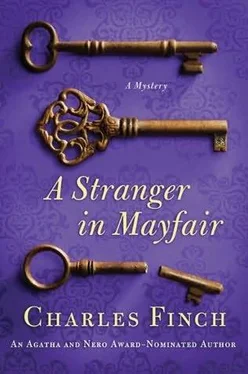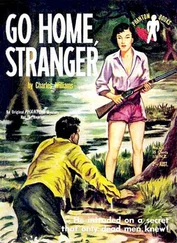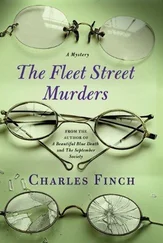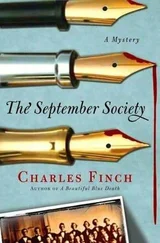Charles Finch - A Stranger in Mayfair
Здесь есть возможность читать онлайн «Charles Finch - A Stranger in Mayfair» весь текст электронной книги совершенно бесплатно (целиком полную версию без сокращений). В некоторых случаях можно слушать аудио, скачать через торрент в формате fb2 и присутствует краткое содержание. Жанр: Исторический детектив, на английском языке. Описание произведения, (предисловие) а так же отзывы посетителей доступны на портале библиотеки ЛибКат.
- Название:A Stranger in Mayfair
- Автор:
- Жанр:
- Год:неизвестен
- ISBN:нет данных
- Рейтинг книги:3 / 5. Голосов: 1
-
Избранное:Добавить в избранное
- Отзывы:
-
Ваша оценка:
- 60
- 1
- 2
- 3
- 4
- 5
A Stranger in Mayfair: краткое содержание, описание и аннотация
Предлагаем к чтению аннотацию, описание, краткое содержание или предисловие (зависит от того, что написал сам автор книги «A Stranger in Mayfair»). Если вы не нашли необходимую информацию о книге — напишите в комментариях, мы постараемся отыскать её.
A Stranger in Mayfair — читать онлайн бесплатно полную книгу (весь текст) целиком
Ниже представлен текст книги, разбитый по страницам. Система сохранения места последней прочитанной страницы, позволяет с удобством читать онлайн бесплатно книгу «A Stranger in Mayfair», без необходимости каждый раз заново искать на чём Вы остановились. Поставьте закладку, и сможете в любой момент перейти на страницу, на которой закончили чтение.
Интервал:
Закладка:
“But first you have your tour,” said Graham.
“Have I?”
“A Mr. Bigham will be by shortly to give it to you, sir. He’s the assistant to the parliamentary historian and generally guides new Members through the House when they arrive. Since you were elected at a by-election, however”-that is to say, a special, one-off election-“you will be the only person on the tour.”
“We all have our trials.”
There was a rap at the door, and a cheerful face, similar to Lenox’s but slightly fatter and jollier, perhaps less pensive, popped through the crack. It was not the tour guide but Sir Edmund Chichester Lenox, 11th Baronet of Markethouse and Member of Parliament for the town of the same name. Charles’s older brother.
Edmund was a genial soul, happier at Lenox House in the country than in town, but he was also an important and reliable member of his party, who took his duties seriously and refused credit for much of his work-to the extent that his importance in the House had been unknown to his own brother until two years before.
“Charles!” said Edmund. “I wondered whether you might be here. My God, they gave you the worst office in the entire place. Young Michaelson had it, but he traded out like a shot when he got the chance. I hope you don’t die of a draft. But come: Has it really been ten weeks? Shake my hand. I stopped in earlier, and Graham told me you were to have a tour, but come have lunch at Bellamy’s afterward, will you?”
This was the famous Members’ restaurant at Parliament.
“Of course,” said Lenox.
“Excellent. In that case, I’ll take my leave and see you then.” Edmund put on his hat, which had been in his hand, and left, whistling down the hallway.
Mr. Bigham, who arrived a few minutes later, proved to be a plump, small man, with big owlish glasses and a dry manner of speech. He sat in front of Lenox’s desk for some twenty minutes and lectured him on various matters of protocol and procedure.
“As you know,” he began, “the House meets at a quarter to four in the afternoon, except on Wednesdays, when we convene at noon. Each sitting begins with a religious service from which the public is barred, but as soon as that ends strangers come into the galleries. Here’s a funny fact, Mr. Lenox: Although there are six hundred and seventy Members of Parliament, only about three hundred and fifty people can fit into the House of Commons! Remarkable, isn’t it? For an important vote we might just cram four hundred in, but not more than that.”
“I suppose many Members don’t come to the sittings?”
“Oh, there are a hundred men who only come to London once a year but find it convenient or pleasurable to hold a seat. Another hundred live in London but still come to the House only once a year. In the end only two hundred or so attend regularly. There are always empty spots on the benches.”
“I shall be part of that two hundred,” said Lenox.
“Shall you?” Mr. Bigham smiled, his jowly face lit up. “I’ve heard that before, I can promise. Now, business. In any given session of the House, you’ll first handle private business-anything of an essentially local nature and any vote pushed through by one of several important companies, including the railroads and the water works. Public business covers pretty much everything else you can imagine…”
Eventually the lecture was over and they were walking through a labyrinth of alternating small and vast hallways, some dim and low-ceilinged, others imposing and portrait-lined. Bigham kept up a steady prattle about the history of the building. A few times Lenox bumped into men he knew and stopped to say hello. It was all starting to feel real; he was here.
That feeling truly took hold of him when they entered the Commons. He had sat in the visitors’ galleries, of course-had from them often watched his own father speak-but to be on the floor, so near the chair of the Speaker of the House…it was a remarkable thing. The room was tiny, ornate, and as hushed as a cathedral.
Mr. Bigham whispered reverently, “To think-from this chamber a group of six hundred and seventy men rule an empire of tens of millions of souls. Once you write your name in the Members’ book, it will remain there forever as part of the history of this time. How lucky you are, Mr. Lenox!”
“I am,” said Lenox. There was a strange hollow place in his chest. “I am,” he repeated. “I know I am.”
Chapter Eight
Still, he hadn’t forgotten the murder. Lenox was particularly eager to see Ludo Starling again, if for no other reason than to further analyze the man’s behavior, which had on their first encounter been so strange. The lie about his wife, for instance. The odd braggadocio of his claims about a palace-bestowed title.
Alas, between the meetings and the reading he had to do, there was no time for it. The task thus fell to Dallington and, of course, Scotland Yard. Inspector Fowler. He had replied to Lenox’s inquiring note with a few perfunctory lines explaining that the Yard had the case well in hand and that outside interference could only hinder the course of the investigation. The note was distinctly unfriendly, if not hostile.
On the second evening after Lenox saw his new offices, Dallington came by with a report. Kirk announced him.
“Who’s this new chappie buttling for you?” asked the young lord. “Surely Graham hasn’t handed his notice in?”
“Not at all, no. He’s become my political secretary. Kirk was Jane’s butler for many years.”
Dallington frowned. “My parents were always trying to make me be a political secretary to some sniveling politician. No offense, of course.”
“Of course.”
“I never saw the good in it. Parliament would burn to the ground before they made me a Member of it, and unless that was your goal it was just a job with long hours and no pay.”
“We haven’t spoken about your parents in some time.”
“Oh?”
“Would it be intrusive of me to ask what their current mood is-on the subject of your new career, I mean?”
“Middling, I’d say. They haven’t thrown themselves off a cliff yet, anyway. It helped when you spoke to Father.”
“I’m glad.”
“But leave that aside-how about Frederick Clarke?”
“Well?”
“What can you possibly mean by saying ‘Well,’ for God’s sake?” asked Dallington with an irritable scowl. “I hope you don’t think I’ve found the murderer or anything like that.”
Lenox chuckled. “No. I only wondered what progress you had made.”
“Too bloody little progress.”
“What have you done?”
“Whatever I could. I was hoping to convince you to come speak to the family with me.”
“Why?”
“Ludo Starling looks at me like I’m a leper.”
“He judges you on outdated information, I fear.”
“It’s not as if I reeled in there on a bender. I was altogether respectful. But he simply said that it was up to the Yard now and turned me out. It was dashed uncomfortable, to be honest.”
“What have you been doing instead, then?”
“Anything I could think of. I interviewed housekeepers and footmen up and down the street. None of them said anything interesting, unfortunately.”
“They knew him? Clarke?”
“Oh, yes, from the shops and the alley-the one where he died. None of them had ever exchanged more than fifty words with him, though. Said he was extremely deferential and polite.”
“That’s a piece of information, at any rate. It makes it less likely that this was a crime of passion or anger.”
“Yes, I hadn’t thought of that.”
“Anything else? Did you ask about the scabs and wounds on his hands?”
“Nobody knew a thing about them. Several people said how large he was, however. If he was in a fight it sounds as if he wouldn’t have been easily overmatched.”
Читать дальшеИнтервал:
Закладка:
Похожие книги на «A Stranger in Mayfair»
Представляем Вашему вниманию похожие книги на «A Stranger in Mayfair» списком для выбора. Мы отобрали схожую по названию и смыслу литературу в надежде предоставить читателям больше вариантов отыскать новые, интересные, ещё непрочитанные произведения.
Обсуждение, отзывы о книге «A Stranger in Mayfair» и просто собственные мнения читателей. Оставьте ваши комментарии, напишите, что Вы думаете о произведении, его смысле или главных героях. Укажите что конкретно понравилось, а что нет, и почему Вы так считаете.












